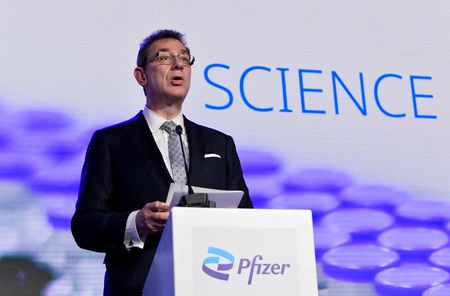
By Michael Erman and Bhanvi Satija
NEW YORK (Reuters) -Pfizer Inc Chief Executive Albert Bourla on Thursday called U.S. plans to negotiate drug prices for its Medicare health program “negotiation with a gun to your head” and said he expects drugmakers to sue in an attempt to halt the process.
“It is not negotiation at all. It is price setting,” Bourla said at a Reuters newsmaker event on Thursday, referring to the Biden Administration’s signature drug pricing reform, part of the Inflation Reduction Act (IRA). The law aims to save $25 billion through price negotiations by 2031 for Americans who pay more for medicines than any other country.
The pharmaceutical industry says the law, passed last year, will result in a loss of profits that will force drugmakers to pull back on developing groundbreaking new treatments.
The companies have begun laying the groundwork to fight the U.S. plan.
“I think that there will be legal action, but I’m not sure if we’ll be able to stop anything before” the new prices take effect in 2026, Bourla said. He added that he is also not optimistic that Congress will act to change the law.
He did acknowledge some positive aspects of the law for patients, such as lower out-of-pocket costs for medicines.
Bourla is looking to shift Pfizer’s focus from the COVID-19 vaccines and treatment that put the company at the forefront of the pandemic response and led to a once-in-a-lifetime surge in revenue.
The company is in the midst of a steep but expected fall in COVID product sales and is also preparing for declining revenue in coming years for some of its top-selling drugs as they begin to face competition from cheap generics.
As a result, investors are looking for Pfizer to produce new blockbuster drugs that can pull in billions every year, either from the company’s own pipeline of medicines in development or through deals.
“Pfizer is giving all the profits that we made from COVID in ’21 and ’22 and what we will make in ’23 to acquire technology and products that we believe will allow us to battle cancer,” he said, calling the effort the drugmaker’s “next moonshot.”
The COVID products drove Pfizer’s revenue to record levels, topping $100 billion in 2022 and $80 billion in 2021.
Bourla has already overseen a string of acquisitions to bolster Pfizer’s drug pipeline, headlined by the $43 billion deal for Seagen, which makes complex targeted cancer therapies.
Pfizer’s other recent deals include its purchase of Biohaven Pharmaceutical Holding, maker of a migraine prevention treatment, for $11.6 billion, a $6.7 billion buyout of ulcerative colitis drug developer Arena Pharmaceuticals, and a $5.4 billion deal for Global Blood Therapeutics with its focus on treating sickle cell disease.
Bourla led Pfizer as the New York-based drugmaker raced alongside German partner BioNTech to develop a vaccine for COVID as much of the world locked down in 2020. The company also developed Paxlovid, a life-saving antiviral treatment for the disease.
The U.S. government will end the COVID Public Health Emergency on Thursday that allowed millions of Americans to receive vaccines, tests and treatments at no cost.
Pfizer and other COVID vaccine makers expect to sell the next round of booster shots on the commercial market rather than directly to the federal government as they had previously.
Pfizer has said it expects to roughly quadruple the price of its COVID shot to about $110 to $130 per dose this year.
(Reporting by Michael Erman in New York; Editing by Bill Berkrot)

